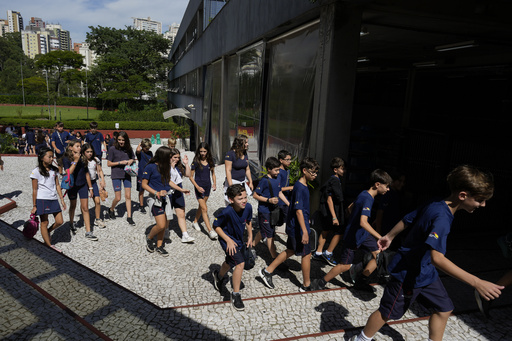SAO PAULO — Brazilian students have returned to school this week with the new challenge of limiting their smartphone use, following a recent law that was enacted to regulate mobile device access in educational settings.
In January, President Luiz Inácio Lula da Silva endorsed legislation aimed at restricting smartphone usage in both public and private schools. The law not only covers classrooms but also hallways, aligning Brazil with similar initiatives seen in the United States and Europe.
While students are permitted to use their phones for educational activities with authorization from their teachers, there are provisions for health and accessibility needs. Schools hold the power to create their own policies regarding phone storage, deciding whether students should keep their devices in lockers, designated baskets, or backpacks.
Prior to this national regulation, numerous states—such as Rio de Janeiro, Maranhao, and Goias—had already implemented their own measures to control phone usage in academic environments. As of 2023, nearly two-thirds of schools across Brazil had imposed certain restrictions, with approximately 28% outright banning smartphone use, according to a 2022 survey conducted by the Brazilian Internet Steering Committee.
However, the enforcement of these varied regulations was inconsistent across different states and educational institutions, leading to calls for a unified federal law. This bipartisan support for national legislation was evident, attracting endorsements from both President Lula’s allies and supporters of former President Jair Bolsonaro. A recent study by Datafolha indicated that nearly two-thirds of survey participants advocate for prohibiting smartphones among students, with over three-quarters believing these devices are more detrimental than beneficial.
Porto Seguro, a private school in Sao Paulo with a history spanning nearly 150 years, implemented its own cellphone ban in classrooms last year. This policy has since been widened to include hallways, advising students to keep their phones in their lockers throughout the school day, even during breaks. Principal Meire Nocito noted in a recent interview that students were struggling to maintain focus, and excessive technology use was contributing to social isolation, with some students opting to engage solely through social media during breaks.
“The prohibition has fostered social interaction among students and encouraged them to confront conflicts, which are an essential part of human relationships. Overall, this shift has yielded positive results,” she expressed.
Brazil’s Ministry of Education recently articulated that the intention behind the restrictions is to safeguard students’ mental and physical well-being and to promote healthier, more mindful engagement with technology. A report earlier this year from the Fundacao Getulio Vargas revealed an alarming statistic: Brazil has more smartphones than residents, with a staggering 258 million devices for a population of 203 million. Research from local market analysts indicated that Brazilians spend over 9 hours daily glued to screens, placing the country among the highest users globally.
Concerns regarding children’s smartphone use have been documented for years, correlating with issues such as bullying, anxiety, suicidal thoughts, and diminished concentration necessary for effective learning. Countries such as China and France have instituted restrictions on youth smartphone usage, and similar bans are gaining traction in the United States, where several states have enacted laws aimed at curtailing device access to minimize classroom distractions.
In Europe, there’s a growing chorus of parents expressing worry about the adverse effects of smartphones on their children’s safety and mental wellness. A September report from the U.N.’s Educational, Scientific and Cultural Organization (UNESCO) noted that one out of every four countries has already established limitations on device usage within educational institutions.
Meta CEO Mark Zuckerberg has publicly acknowledged societal concerns related to children facing exploitation and bullying on social media platforms, taking responsibility during a U.S. Senate hearing. He mentioned Meta’s ongoing commitment to bolster protections for minors online.
Mariana Waetge, a 13-year-old student at Porto Seguro, reflected on her five-year experience with a smartphone, utilizing it to stay connected and entertained through social media, particularly Instagram. The current ban on phones has led her to explore new avenues for connection with friends, enhance her concentration, and even improve familial relationships.
“The restriction means that individuals who often found it hard to make friends and relied on their phones for diversion no longer have that option,” she said in an interview. “They end up engaging in board games or diving into books now.”




